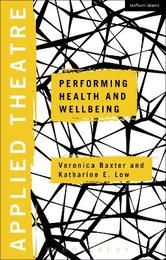
|
Applied Theatre: Performing Health and Wellbeing
Paperback / softback
Main Details
| Title |
Applied Theatre: Performing Health and Wellbeing
|
| Authors and Contributors |
Edited by Dr Veronica Baxter
|
|
Edited by Dr Katharine E. Low
|
|
Series edited by Prof Michael Balfour
|
|
Series edited by Dr Sheila Preston
|
| Series | Applied Theatre |
|---|
| Physical Properties |
| Format:Paperback / softback | | Pages:344 | | Dimensions(mm): Height 216,Width 138 |
|
| Category/Genre | Drama |
|---|
| ISBN/Barcode |
9781472584571
|
| Classifications | Dewey:306.4848 |
|---|
| Audience | | Professional & Vocational | | Tertiary Education (US: College) | |
|---|
| Illustrations |
10 b/w illus
|
|
Publishing Details |
| Publisher |
Bloomsbury Publishing PLC
|
| Imprint |
Methuen Drama
|
| Publication Date |
26 January 2017 |
| Publication Country |
United Kingdom
|
Description
Applied Theatre: Performing Health and Wellbeing is the first volume in the field to address the role that theatre, drama and performance have in relation to promoting, developing and sustaining health and wellbeing in diverse communities. Challenging concepts and understanding of health, wellbeing and illness, it offers insight into different approaches to major health issues through applied performance. With a strong emphasis on the artistry involved in performance-based health responses, situated within a history of the field of practice, the volume is divided into two sections: Part One examines some of the key questions around research and practice in applied performance in health and wellbeing, specifically addressing the different regional challenges that dominate the provision of health care and influence wellbeing: how the ageing population of the global north creates pressure on lifetime healthcare provision, while the global south is dominated by a higher birth rate and a larger population under 15 years old. Part Two comprises case studies and interviews from international practitioners that reflect the diversity of practices across the world and in particular differences between work in the northern and southern hemispheres. These case studies include a sanitation project in a Hmong refugee camp in Thailand in the 1980s, and the sanitation and rural development projects initiated by the travelling theatre troupes of a number of University theatre departments in Africa - Makerere in Kampala, Uganda; Botswana; Lesotho and Dar es Salaam, Tanzania - which began in the 1960s. It considers the emergence of Theatre for Development's use as a health approach, considering the work of Laedza Batanani and the influences of Augusto Boal's Theatre of the Oppressed.
Author Biography
Katharine E. Low is a lecturer in Applied Theatre and Community Performance at the Royal Central School of Speech and Drama, University of London, UK. She has previously researched and facilitated practice in Tanzania and South Africa with specific reference to sexual health and local responses to HIV/AIDS prevention, as well as working with HIV+ refugee women in Manchester. Dr Veronica Baxter is the convenor of the Honours programme and the Masters in Applied Theatre at the University of Cape Town, South Africa, and has taught at South African and English universities for 25 years, focusing on applied theatre and drama, directing, theatre history and South African theatre.
ReviewsThis collection adds rich new perspectives to ongoing debates about the cultural locations of health care, theatre, and power ... A highly valuable contribution to expanding the boundaries of this growing field. * New Theatre Quarterly * Emphasizing ways in which performance techniques can support the promotion of health care, Applied Theatre is a valuable, well-researched study on a topic of practical concern. Reconsidering established notions of how illness and wellness are broadly understood, the collection examines both practical and aesthetic concerns in reconsidering prevailing concepts. In part 1, Baxter (Univ. of Cape Town, South Africa) and Low (Univ. of London, UK), both specialists in applied theater, introduce the book and establish its goals. The chapters in part 2 are multifaceted: primarily geographical, they identify specific health problems facing populations in the "global" north (ageing citizenry) and south (higher birth rate, more youthful population), and the aesthetic and research means by which these "local" problems can be addressed. The more interesting parts of each chapter are case studies and interviews with artists and medical practitioners, many in the developing world, dealing with hygiene and sanitation concerns, rural development issues, and so on. Though pitched at practitioners using theatrical techniques in health care broadly defined, the volume offers fascinating angles on a little-explored subject that will interest readers in a variety of disciplines. Summing Up: Recommended. * CHOICE *
|